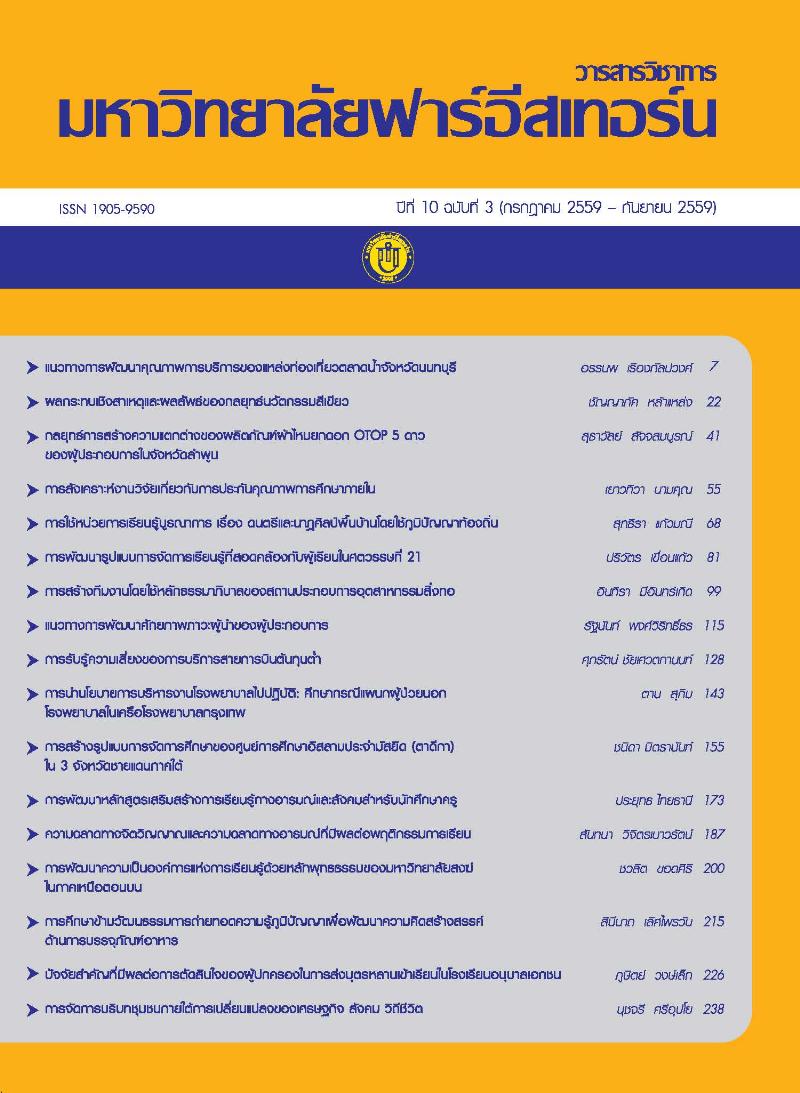ความฉลาดทางจิตวิญญาณและความฉลาดทางอารมณ์ที่มีผลต่อพฤติกรรมการเรียน ของนักศึกษาคณะศึกษาศาสตร์ มหาวิทยาลัยราชภัฏจันทรเกษม
Main Article Content
Abstract
การวิจัยนี้มีวัตถุประสงค์เพื่อ (1) ศึกษาความฉลาดทางจิตวิญญาณ ความฉลาดทางอารมณ์ และพฤติกรรมการเรียนของนักศึกษาในคณะศึกษาศาสตร์ มหาวิทยาลัยราชภัฏจันทรเกษม (2) ศึกษาความสัมพันธ์ของความฉลาดทางจิตวิญญาณ ความฉลาดทางอารมณ์และพฤติกรรมการเรียนของนักศึกษา (3) การศึกษาเปรียบเทียบความฉลาดทางจิตวิญญาณ ความฉลาดทางอารมณ์ และพฤติกรรมการเรียนของนักศึกษาก่อนการทดลองและหลังการทดลองระหว่างกลุ่มทดลองและกลุ่มควบคุม การศึกษานี้เป็นการวิจัยกึ่งทดลอง กลุ่มตัวอย่างเป็นนักศึกษาที่มีเกรดเฉลี่ยต่ำกว่า 2.00 ที่สมัครใจเข้าร่วมการทดลอง จำนวน 40 คนโดยแบ่งเป็นกลุ่มทดลองและกลุ่มควบคุมด้วยวิธีการสุ่มอย่างง่ายเพื่อให้สมาชิกทั้งสองกลุ่มมีคุณสมบัติ ซึ่งในกลุ่มทดลองให้เข้าร่วมกิจกรรมตามโปรแกรมการพัฒนาความฉลาดทางจิตวิญญาณ ความฉลาดทางอารมณ์และพฤติกรรมการเรียนของนักศึกษา ส่วนในกลุ่มควบคุมมีการให้ข้อสนเทศในเรื่องเดียวกัน และทำการเก็บข้อมูลโดยทำการทดสอบก่อนและหลังการทดลองทั้งสองกลุ่ม ทุกขั้นของความฉลาดทาง
จิตวิญญาณ ความฉลาดทางอารมณ์ และพฤติกรรมการเรียนของนักศึกษา เก็บข้อมูลมาวิเคราะห์โดยใช้สถิติการวิเคราะห์ ANCOVA (Analysis of Covariance)
จากการศึกษาพบว่า: ความฉลาดทางจิตวิญญาณ ความฉลาดทางอารมณ์ และพฤติกรรมการเรียนของนักศึกษาหลังการทดลองมีพฤติกรรมในการเรียนของนักศึกษาไปในทางที่ดีกว่าและสูงกว่าก่อนการทดลอง ส่วนความฉลาดทางจิตวิญญาณ ความฉลาดทางอารมณ์ และพฤติกรรมการเรียนมีผลต่อการผันแปรพฤติกรรมในการเรียนของนักศึกษาอย่างมีนัยสำคัญทางสถิติ และจากการเปรียบเทียบพฤติกรรมการเรียนของนักศึกษากลุ่มทดลองในความฉลาดทางจิตวิญญาณและความฉลาดทางอารมณ์หลังการทดลองสูงกว่าก่อนทดลอง ส่วนพฤติกรรมการเรียนของนักศึกษาในส่วนของทัศนคติในการเรียน แรงจูงใจในการเรียน ความวิตกกังวลในการเรียน การมีสมาธิต่อการเรียน กระบวนการรวบรวมข้อมูลในการเรียน และการเลือกเนื้อหาที่สำคัญ ในกลุ่มทดลองหลังการทดลองสูงกว่าก่อนทดลอง ข้อค้นพบดังกล่าวชี้ให้เห็นว่าการประยุกต์ความฉลาดทางจิตวิญญาณ ความฉลาดทางอารมณ์ และพฤติกรรมการเรียนมาใช้มีคุณค่าการปฏิบัติในทางวิชาการ อีกทั้งพบว่ามีอิทธิพลสำคัญต่อพฤติกรรมการเรียนของนักศึกษาให้มีประสิทธิ์ยิ่งขึ้น
Article Details
1. Any views and comments in the Journal of Social Innovation and Lifelong Learning are the authors’ views. The editorial staff have not to agree with those views and it is not considered as the editorial’s responsibility.
2. The responsibility of content and draft check of each article belongs to each author. In case, there is any lawsuit about copyright infringement. It is considered as the authors’ sole responsibility.
3. The article copyright belonging to the authors and The Far Eastern University are copyrighted legally. Republication must be received direct permission from the authors and The Far Eastern University in written form.
References
กรมสุขภาพจิต. (2554). รายงานการพิจารณาศึกษา เรื่อง วิกฤติเด็กไทย IQ ต่ำ. ค้นเมื่อวันที่ 7 เมษายน 2557, จากhttp://www.senate.go.th/w3c/senate/pictures/comm/60/file_138543511 3. PDF
สุชาติ ประสิทธิ์รัฐสินธุ์. (2550). ระเบียบวิธีการวิจัยทางสังคมศาสตร์. กรุงเทพมหานคร: สามลดา.
Binet, A. (1905). The Benet-Simon Intelligence Scale. Retrieved April 7, 2014, from http:// childpsych.umwblogs.org/intelligence-testing-2/binet-simon-scale/
Bloom, B.S. (1976). Human Characteristics And School Learning. New York : McGraw-Hill Book Co.
Cote, S. & Miners, C.T.H. (2006). Emotional intelligence, cognitive intelligence and job performance. Administrative Science Quarterly. 51(1), 1-28.
Green, W. N. & Noble, K.D. (2010). Fostering spiritual intelligence: Undergraduates’ growth in a course about consciousness. Advanced Development Journal. 12, 26-48.
Goleman, D. (1995). Emotional Intelligence. New York: Bantam.
Goleman, D. (1998a). Working With Emotional Intelligence. New York: Bantam.
Goleman, D. (2001). Emotional Intelligence: Issuesin Paradigm Building. In C. Cherniss & D. Goleman (Eds.). San Francisco: Jossey-Bass.
King, D. B. & DeCicco, T.L. (2009). A viable model and self-report measure of spiritual intelligence. International Journal Of Transpersonal Studies. 28, 68-85.
Maslow, A. H. (1971). The Farther Reaches Of Human Nature. New York, NY: Viking Press.
Rossiter, A. (2006). Developing Spiritual Intelligence. New York: O Books.
Saidy, E.P., Hassan, A., Rahman, F.A., Jalit, H.A. Ismail, L.A. & Krauss, S.E. (2009). Influence of emotional and spiritual intelligence for the national education philosophy towards language skills among secondary school students. European Journal Of Social Science. 9(1), 61-71.
Scriven, M., & Paul, R. (1992). Critical Thinking Defined. Handout Given At Critical Thinking Conference, Atlanta: GA.
Sinnott, J. D. (2002). Introduction. Journal Of Adult Development. 9, 199-200.
Templeton, M. J. (2000). The Nature Of Spiritual Transformation. Retrieved April 7, 2014, from http://www.metanexus.net/archive/spiritualtransformationresearch/research/pdf/STSRP-LiteratureReview2-7.PDF
Weinstein, P. & Palmer. L. (2002). Learning And Study Strategies Inventory (LASSI) : Second Edition. Texas: H & H Publishing Company, Inc.
Zohar, D. & Marshall, I. (2000). SQ: Spiritual Intelligence: The Ultimate Intelligence. New York: Bloomsbury.
Zohar, D. & Marshall, I. (2004). SQ: Spiritual Intelligence: Wealth We Can Live By. San Francisco: berrett-Koehler Publisher.

